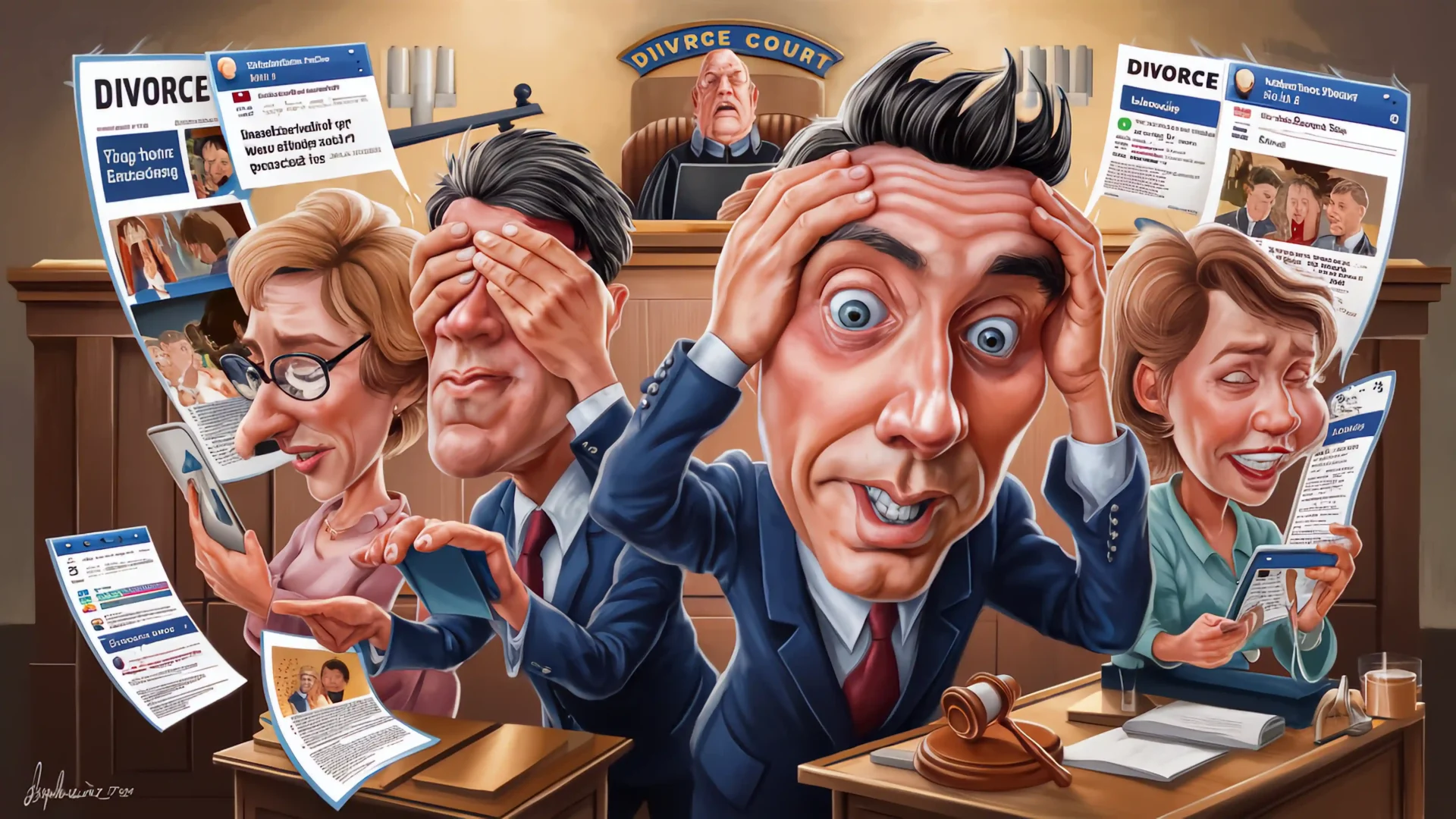Table of Contents (Click To Jump)
Did you know that a whopping 90% of divorce attorneys report more social media evidence in cases1? Those harmless selfies and updates can turn into huge problems faster than hitting “unfriend.”
In our digital world, 72% of Americans post everything from coffee moments to life’s milestones online. Platforms like Facebook and Twitter turn our moments into more than fun – they become legal firewood2.
Imagine posting something bold or changing your status to “In a relationship” suddenly. Bam! That’s now proof in your divorce. Courts are always searching for online clues that might tip the scales in divorce battles1. So, if you’re showing off a new purchase or complaining about your partner, be careful. It could turn against you.
Key Takeaways
- 90% of divorce lawyers report increased use of social media evidence in cases1.
- Social media posts, from status updates to photos, can be used as legal evidence in U.S. divorce laws2.
- 72% of Americans are active on social media, offering ample evidence in divorce proceedings2.
- Courtrooms are scrutinizing social media for digital breadcrumbs to sway cases1.
- Think twice before posting rants or flaunting new relationships – it could affect your case.
The digital trails we leave on social media can lead straight to court. Now, over 80% of divorce lawyers use social media evidence. This evidence ranges from Facebook to Instagram3. No post or picture is safe from scrutiny.
Why Lawyers Hunt for Your Online Footprint
Lawyers have become digital sleuths in divorce cases. They search online to find the truth. Hidden relationships and financial gains are just a click away4.
Digital evidence is crucial. In fact, 1/3 of all legal divorce disputes start from online activities4.
Common Social Media Sites Checked During a Divorce
| Platform | Common Use in Divorce |
|---|---|
| Posts, photos, relationship updates | |
| Stories, tagged photos, captions | |
| Tweets, retweets, likes |
Facebook is often used as evidence in two-thirds of divorce cases3. Instagram and Twitter also play big roles. Every platform can reveal crucial details.
Public Posts Versus Private Messages
Both public posts and private messages are examined in divorce cases. Public posts are visible to anyone, but don’t think private messages are secure. Courts have ruled there’s no privacy on social media3.
Only real social media evidence is used in court3. Think twice before deleting posts or accounts. Such actions can be illegal3.
The best way to avoid trouble is to clean up your online presence. Or better, stay off social media during divorce proceedings altogether.
Thinking about going to court? You might want to reconsider posting about your beach trips or your fancy new car. In divorce, things like tweets, photos where you’re tagged, and even dating profiles showing you as single can be used against you. Imagine your innocent Instagram picture ending up as key evidence in court.
With over 75% of Americans on social media, there’s a lot of potential evidence5. Lawyers love using this digital treasure trove. It’s no shocker that 81% of divorce lawyers use social media evidence in court6. And it’s not just your posts—photos online, even ones others post, can be used in court, especially in cases about who gets the kids5.
Think deleting your posts makes them disappear? Think again. Erasing your digital footprints can actually get you in trouble, even with charges of obstructing justice7. Your so-called friends on social media can be used to find harmful info in your private posts. Suddenly, your friend circle turns into a group of witnesses against you7. Making your social media accounts public makes it easy to use your posts as evidence in divorce cases7.

Most Americans use social media, so it’s likely your spouse will use it in a divorce case57. With Facebook being a major evidence source in 66% of divorce cases6, your posts can really impact the case. It all comes down to how online actions are viewed in court, where even a “like” or “share” can mean a lot.
So, be careful what you post online. Court cases can use your social media as evidence. It’s a fact of our digital lives. Being ethical online isn’t just wise—it’s crucial.
Your social media might tell a story you didn’t mean to share. Posting party pictures when you’re missing parent meetings is a bad idea. These posts can make you look not ready for parenting duties in the eyes of the court.8 If they see you’re not acting like a responsible adult, you could get less time with your kids. And if there’s proof you’re using drugs or drinking too much, that’s even worse.8
Proving Location and Activities
Courts are now looking at social media to judge if you’re a fit parent. Showing off trips without your kids can hurt your case. Lawyers use your posts to show if you’re really where you say you are. If your online life doesn’t match up with being a good parent, it can affect custody.8
Spending Habits Revealed Through Posts
Be careful what you brag about buying on social media. Showing off fancy things while saying you’re broke in court is risky. Half of the lawyers say they’ve seen more cases where posts show someone can actually pay more support.9 Your online posts about money can really change how the court sees your ability to support your kids. Think before you post that next big buy or trip.
The things you share online can paint a picture of how you spend money and take care of your kids. No detail is too small for the court to notice. In today’s world, what you do online can affect your life offline in big ways.
Using social media during a divorce is risky. One wrong post can cause big problems, like a fast-exploding burrito. Every action on social media can turn into evidence against you. Social media can greatly affect divorce outcomes10. Our online activities can reveal a lot of information.
Here’s a fact: social media causes one in seven divorces10. Even if your ex isn’t watching, their lawyer might be. Posts can become evidence in court, making your fun photos a problem. Social media can fuel jealousy and unhappiness, breaking marriages apart10.
Think twice before you post something new. It’s often wise to use social media less during a divorce10. Experts recommend changing passwords, taking a break, and making sure no harmful content is up10. Being careful online helps keep things smooth with your ex, and could benefit you legally10.
To avoid mess-ups in court, be careful with social media. Taking a break can prevent regrettable posts. Getting legal advice on your online behavior can protect you from trouble and lead to better results10.
FAQ
How do lawyers use social media evidence in divorce cases?
Lawyers search social media for posts, photos, and updates. They look for clues about money, cheating, and parenting. Those beach selfies might look innocent. But, in court, they could spell trouble if they suggest something’s off.
Which social media platforms are usually scrutinized during a divorce?
Lawyers check out Facebook, Instagram, Twitter, and more. LinkedIn, Snapchat, and TikTok aren’t safe either. If you’re posting, they’re watching.
Are private messages admissible as evidence in court?
Private messages aren’t as private as you think. They can be pulled into court. Friends or fake accounts can spill your secrets. What you type can be used against you.
What types of social media evidence are admissible in court?
Almost everything on your profile can be evidence. Screenshots, timings, and even “deleted” stuff could be used. Be careful what you share online.
Can my social media activity affect child custody and support decisions?
Your online actions can impact custody and support. Where you are, what you do, and your spending can all be judged. Bad choices can backfire, like partying instead of parenting, or big spends when claiming poverty.
What are some risks of using social media during divorce proceedings?
Posting can backfire. Every action can be misconstrued as evidence. Deleting things can look guilty. It’s smarter to stay quiet online until the divorce is final.
Source Links
- https://kellylegalfirm.com/2023/07/03/dos-and-donts-of-social-media-during-divorce/
- https://www.wkofamilylaw.com/blog/can-social-media-be-used-as-evidence-in-divorce-court
- https://www.silvadivorce.com/blog/use-of-social-media-in-a-divorce-case/
- https://natlawreview.com/article/family-law-social-media-evidence-divorce-cases
- https://zacharylawgroup.com/4-types-of-social-media-evidence-admissible-in-divorce-court-chandler-family-lawyer-insights/
- https://www.leighdaniellaw.com/blog/social-media-during-divorce/
- https://www.arnoldsmithlaw.com/how-social-media-posts-are-used-as-evidence-in-divorce-cases.html
- https://www.oflaherty-law.com/learn-about-law/do-my-social-media-posts-impact-child-custody-outcomes
- https://www.grossmanlawoffices.com/our-blog/2023/july/how-social-media-can-impact-divorce-proceedings/
- https://damelegal.com/blog/complete-guide-divorce-social-media/

